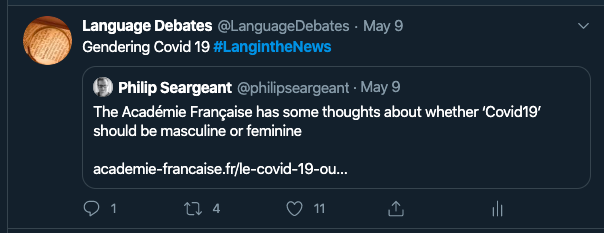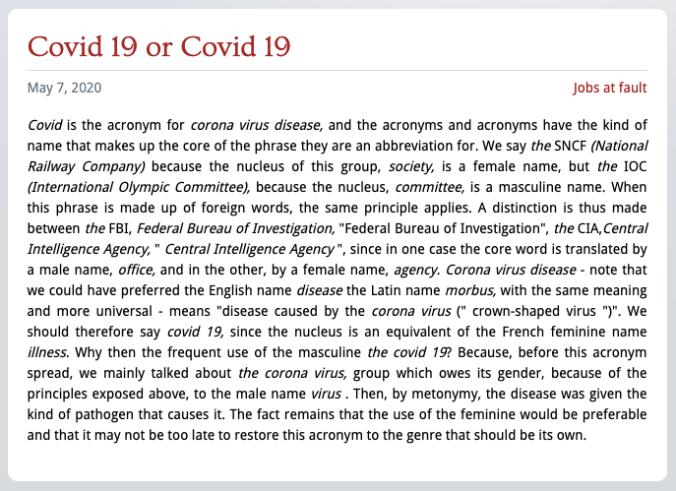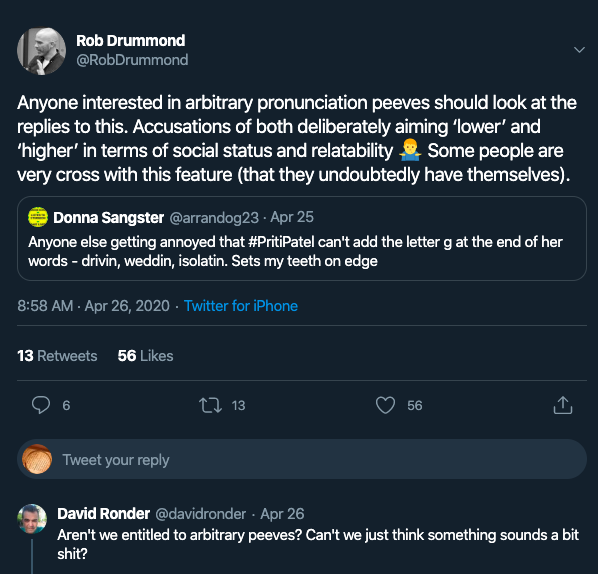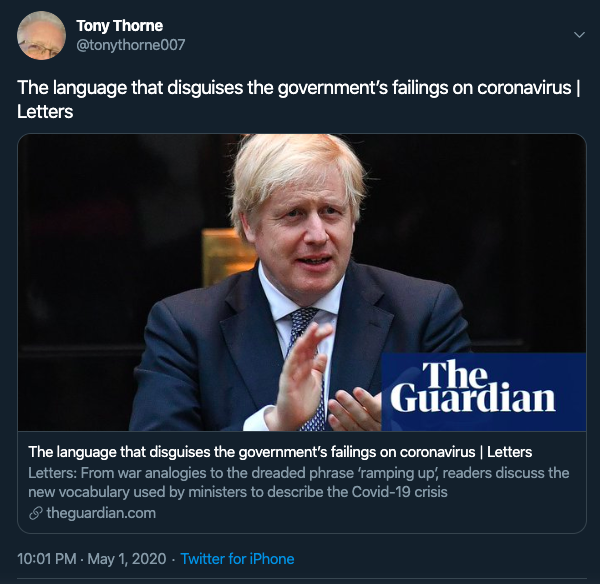This is the first in a series that will select – for your delight and delectation – some of the most interesting language-related news morsels you might have missed from my Twitter feed (under #LangintheNews).
The material here is great for lesson starters for A-level teachers, as mini CPD for your English Dept. staff, for priming potential KS4 students for English Language A-level or just for general interest. All could be developed into full lessons. Drop me a message if you’d like to see how I’d do it for any of these.
Gendering Covid-19

Gendering Covid-19 tweet from 9th May
This tweet came courtesy of Philip Seargeant (@philipseargeant), an applied linguist at the Open University who specialises in the relationship between language, politics and social media. I know his work from my postgrad studies. You can find his website here, which has some nice links to plunder.
The tweet links to the Académie Française website, which is an institution worth discussing with your students because – counter to descriptivist theories of language favoured at A-level – they are a council who chooses what counts as ‘real’ French. There are LOTS of discussion to be had about that with students – not least about their nickname ‘The Immortals’.
Here is the specific page on their website (translated into English by my web browser – I can’t take any credit or censure for it) about their decision about how to gender Covid-19.

The Academy argue for a female gendering despite common usage being male
The post can lead into all sorts of nice discussions about neologisms, affixation, etymology, language change, gender and multilingualism. Equally, this wider prescriptivist idea – upheld by the Academy – that language rules can, and should, be imposed on usage that run counter to actual real-life use. This is GOLD for getting students into some of the social and philosophical complexities of language use.
There some nice response articles floating around you might want to look at too, like this one from The Independent.
Accent Peeves and Priti Patel
This tweet is from April but is pretty common on my twitter feed: a person comments on something that annoys them about someone else’s way of speaking, then the fabulous hoards of linguists I follow try to respond with thoughtful, helpful and well-informed discussion about why the initial annoyed comment may say more about social forces at work in the world than anything inherently ‘wrong’ with the way someone speaks…
I give you exhibit A…

Original comment on Priti Patel’s g-dropping and response from linguist Rob Drummond which popped up in my feed.
The press briefing that our annoyed commentator seems to have been talking about (based on the date posted) is this one.
Short clips like this are great for focused discussion with students about phonology, accent, dialect, political language or language and power. Specifically, you could talk about politicians upwardly or downwardly converging to a perceived audience and link that to status and prestige – overt or covert.
The peevish tweet is great for kick starting / developing discussion around social attitudes to accent/dialect. Or perhaps for gender, if you want to take it in a slightly different direction. There’s loads of research suggesting that women’s language is policed in a way men’s isn’t, especially in the public eye.
The response above comes from sociolinguist Rob Drummond (@RobDrummond). He works at Manchester Metropolitan University and specialises in urban youth identity and ethnographic approaches to language study (which – you could argue – is the opposite approach to the Académie Française). You can find his website here.
The two tweets together do a decent job of representing the very general approaches to language study we characterise at A-level as prescriptivist and descriptivist. Again – threads like this are common so I expect to see more in other #LangintheNews roundups.
Metaphors for Covid-19
There’s a LOT of work being done by current linguists on tracking and monitoring the use of metaphors to characterise the pandemic. There are linguists actively lobbying for ‘unhelpful’ metaphors – especially war-related – to be ditched by public figures. They argue that, at best, bad metaphors misrepresent the situation and, at worse, flagrantly manipulate public responses to it in ways that are dangerous. Have a look at #reframecovid
See an example here of letters to the Guardian, where members of the public discuss how they think politicians’ metaphors are often deliberate ploys to obfuscate their responsibilities – brought to me via Tony Thorne (@tonythorne007) a lexicographer who consults at King’s College London.

Letters to the Guardian talk about readers’ objections to characterising Covid-19 as an ‘enemy’ or to phrases like ‘ramping up’ or words like ‘unprecedented’.
This is good for ways into discussing: metaphor, semantics, pragmatics, media language, language and power, and language change.
Experienced teachers will know that it’s always tricky to help students realise that metaphor in public discourse MATTERS. This is a good starting point.
That’s it for now! Let me know if the roundup format is useful.